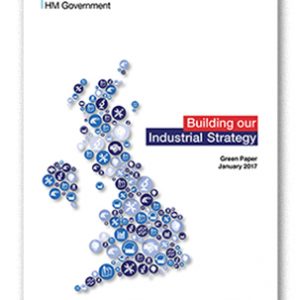The government has published its industrial strategy white paper this morning, with details of a national retraining partnership unveiled.
The document, called Industrial Strategy: Building a Britain for the future, has just been published on gov.uk, following up on the green paper published in January.
It elaborates on what is planned for the “ambitious rational retraining scheme”, involving a new partnership.
“To drive up adult learning and retraining, we will introduce an ambitious national retraining scheme in England by the end of this parliament,” it said.
“A high level advisory group – the national retraining partnership – will bring together the government, businesses and workers, through the Confederation of British Industry and the Trades Union Congress, to set the strategic direction and oversee implementation of the scheme.
“The national retraining scheme will be informed by £40 million announced in the spring budget to test innovative approaches to helping adults up-skill and re-skill. The pilots will help us learn more about how to support and incentivise adults to learn skills that will help them, their local economies and national productivity.”
Starting next year, it adds, the national retraining scheme will “initially target skills shortages in key sectors, ensuring that we can develop much-needed digital and construction skills”.
A total of £30 million will be invested to test the use of artificial intelligence and innovative education technology (edtech) in online digital skills courses, so that students can benefit from this emerging technology.
“We will provide £34 million to expand innovative construction training programmes across the country, including a programme in the West Midlands, focused on supporting the country’s housing needs and building upon existing good practice.”
It is elaborating on retraining funding announced through the budget last week, although senior figures including Liberal Democrats leader warned more funding was still needed to make much of the industrial strategy work.
Lower investment, reduced research funding, reduced labour market access plus falling apprenticeships could cripple #IndustrialStrategy
— Vince Cable (@vincecable) November 27, 2017
The new document also reflected on performance measures.
“We will update school and college performance measures to ensure that students can make an informed choice between technical or academic education in time for the introduction of the first T levels, recognising them as equally valued routes,” it said.
With regards to the apprenticeships levy it said: “From April 2018, we plan to allow levy-paying employers in England to transfer up to 10 per cent of their funds to another employer, including within their supply chain.”
There was also a section reaffirming the government’s commitment to FE devolution.
“The government has a role to play in ensuring that the connections and capacity exist in local areas and regions to link educational institutions with labour market,” it said. “Devolution of
budgets and control within England plays its part, and we will devolve the adult education budget to mayoral areas in 2019.”
Building on the progress made since January, Business Secretary @GregClarkMP will launch the #IndustrialStrategy White Paper at 9:30am today pic.twitter.com/z2y2aICBlv
— Dept for BEIS (@beisgovuk) November 27, 2017
Another new document published this morning, called Industrial Strategy: the Five Foundations, said one of its key policies would be to “establish a technical education system that rivals the best in the world, to stand alongside our world-class higher education system”.
The government’s industrial strategy green paper was published in January.
It contained encouraging words for those, including Labour MP David Lammy, who had been campaigning for more funding for adult education and a return to widespread “night schools”. The white paper’s announcements on the national retraining scheme will be seen as further development of this.
The green paper acknowledged that there is a “growing challenge” with lifelong learning.
“People are living and working longer, but training across working life is going down,” it added.
It committed to exploring “ambitious new approaches to encouraging lifelong learning, which could include assessing changes to the costs people face to make them less daunting; improving outreach to people where industries are changing; and providing better information”.
The green paper also fleshed out what it expects from a “prestigious” new network of Institutes of Technology, set to be handed £170 million to improve higher-level technical education nationwide.
The government first announced plans for the institutes in July 2015, then again through its Post-16 Skills Plan in July.
The Prime Minister’s office confirmed in a press statement, as reported in FE Week and looking ahead to publication of the green paper called Building Our Industrial Strategy, that £170 million of capital funding would be spent on these.
The green paper itself stressed that these “institutes will increase the provision of higher-level technical education”, to ensure that it is available “in all areas”.
The green paper also acknowledged issues colleges are experiencing with maths and English and maths GCSE resits.
Since 2013 all 16 to 18-year-old students who do not already have a grade C in GCSE English and maths have had to continue studying these subjects – and in 2015, this was further tightened to require those with a grade D to only study GCSE rather than an alternative.








Your thoughts